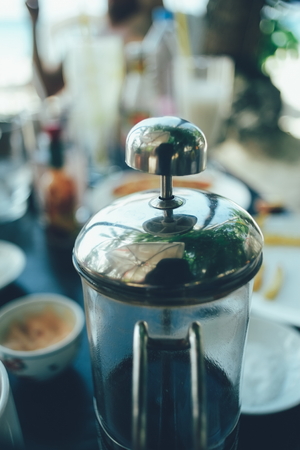Origins of the Moka Pot in Italy
The story of the Moka pot begins in early 20th-century Italy, a nation deeply intertwined with coffee culture and rituals. Invented by Alfonso Bialetti in 1933, the Moka pot revolutionised the way Italians brewed coffee at home, making rich, espresso-like coffee accessible to households across the country. This iconic stovetop brewer, instantly recognisable with its octagonal shape and polished aluminium finish, quickly became a staple in Italian kitchens. The Moka pot is more than just a brewing device; it represents family traditions, daily routines, and the convivial spirit that defines Italian life. Over generations, it has played a pivotal role in shaping Italy’s distinctive coffee culture—one that values both craftsmanship and community. In essence, the Moka pot stands as a symbol of Italian ingenuity and hospitality, bridging the gap between artisanal café experiences and the comfort of home-brewed coffee.
2. Introduction to the UK: Early Encounters and Adoption
The story of the Moka Pot’s arrival in the United Kingdom is one that reflects both the evolution of British coffee culture and the broader social changes brought about by post-war migration. Unlike its rapid embrace in Italy, the Moka Pot made a more gradual entrance into British homes and cafés, largely mirroring shifts in taste and a growing appreciation for continental styles of coffee.
Early Appearances: Post-War Curiosity
The first notable encounters with the Moka Pot in the UK can be traced back to the late 1950s and early 1960s, when increased travel to Europe exposed Britons to new culinary experiences. Italian immigrants settling in London, Manchester, and other major cities played a pivotal role in introducing traditional espresso-based brewing methods. The elegant, stovetop design of the Moka Pot quickly caught the eye of those seeking alternatives to instant coffee—a staple in many British households at the time.
Initial Reception: A Slow but Steady Shift
While some early adopters embraced the rich, full-bodied brew produced by the Moka Pot, widespread adoption was initially tempered by both practicality and tradition. Many Britons were accustomed to tea or instant coffee, and the ritual of using a stovetop brewer required a shift in daily routines. However, as Italian cafés began to flourish—particularly in London’s Soho district—the demand for authentic espresso-style coffee grew steadily. This cultural exchange fostered greater curiosity and acceptance of the Moka Pot among British consumers.
Influence of Italian Immigration on Coffee Habits
| Aspect | Before Italian Influence | After Italian Influence |
|---|---|---|
| Coffee Preparation | Mainly instant coffee or percolators | Moka Pots and espresso machines introduced |
| Café Culture | Traditional tearooms dominant | Rise of Italian-style cafés and espresso bars |
| Beverage Preferences | Mild filter or instant coffee | Stronger, richer brews favoured |
| Social Rituals | Coffee as a quick drink at home or work | Coffee as a social experience in cafés |
This period marked a turning point where British coffee-drinking habits began to evolve under Italian influence. The Moka Pot stood at the centre of this transformation, symbolising both an openness to new brewing techniques and a move towards more sophisticated tastes. As subsequent decades unfolded, its place within British kitchens became increasingly secure—a testament to its enduring appeal and adaptability within the UK’s unique cultural landscape.

3. Evolution of British Coffee Culture
The transformation of British coffee culture over the past few decades has been nothing short of remarkable. Historically, the UK was synonymous with tea—a beverage deeply woven into the fabric of British identity, from afternoon teas to builders’ brews. Coffee, while present, often played second fiddle and was generally limited to instant varieties or basic cafetière preparations.
However, the late 20th and early 21st centuries saw a marked shift in attitudes towards coffee. The influx of continental influences, particularly from Italy, France, and beyond, began to reshape how Britons approached their morning cup. European-style cafés started appearing on high streets across the country, offering espresso-based drinks and introducing new brewing methods that stood in stark contrast to traditional British tea rituals.
This gradual yet significant change was propelled by an increased appetite for quality and variety. Britons became more adventurous, seeking out freshly ground beans and experimenting with different preparation techniques. The Moka Pot, with its distinctive design and ability to brew rich, aromatic coffee at home, quickly found favour among those looking to replicate café-quality beverages without investing in expensive espresso machines.
Today, while tea remains a beloved staple, coffee enjoys a newfound respect across the UK. Artisanal coffee shops flourish in both urban centres and rural towns, reflecting a broader cultural embrace of global coffee traditions. The integration of continental brewing methods—such as the Moka Pot—has not only elevated standards but also encouraged a deeper appreciation for the nuances of flavour extraction and roast profiles among British consumers.
This evolution underscores a broader trend: Britain’s willingness to adapt and celebrate culinary diversity. As a result, the once clear-cut divide between tea and coffee has softened, allowing both beverages to coexist harmoniously within modern British life.
4. The Moka Pot’s Place in the Modern British Home
In today’s Britain, the Moka pot enjoys a unique position among coffee enthusiasts, blending continental flair with a growing appetite for home-brewed quality. While espresso machines and pod-based devices have made their mark, many British households are rediscovering the Moka pot as a cherished symbol of authenticity and sophistication in coffee preparation. This shift reflects broader trends towards artisanal methods and a renewed appreciation for hands-on brewing.
The Allure of Authenticity
For many Britons, the Moka pot stands out as an emblem of genuine coffee culture. Its Italian roots evoke notions of tradition and craftsmanship, offering an experience that goes beyond convenience. Unlike instant coffee or automated machines, using a Moka pot requires a degree of skill and care—qualities increasingly valued by those seeking more than just a caffeine fix.
Symbolism and Social Perception
The act of brewing with a Moka pot has become intertwined with notions of sophistication and cosmopolitan living. In social settings, serving coffee from a Moka pot can signify both an appreciation for classic European style and a commitment to quality. This is particularly evident among younger urban professionals who view home-brewing as both a ritual and a statement.
Moka Pot vs. Other Brewing Methods in British Homes
| Brewing Method | Perceived Sophistication | Authenticity | Ease of Use | Popularity Trend |
|---|---|---|---|---|
| Moka Pot | High | High (Italian heritage) | Moderate (requires attention) | Rising among enthusiasts |
| Pod Machine | Medium | Low (mass-market) | Very Easy | Stable but plateauing |
| Cafetiere (French Press) | Medium-High | Medium (European association) | Easy | Consistently popular |
| Instant Coffee | Low | Low (processed) | Very Easy | Slightly declining |
The Future Outlook: A Permanent Fixture?
The resurgence of the Moka pot signals more than nostalgia; it embodies the modern British desire for mindful consumption and connection to global traditions. Whether as part of a morning routine or weekend gathering, the Moka pot has cemented its place as both a practical tool and a cultural icon within UK coffee culture.
5. Comparative Brewing: Moka Pot Versus British Traditions
When examining the Moka Pots role within British coffee culture, it is essential to contrast its brewing technique and resulting cup profile with traditional British methods—most notably, the classic filter coffee and the ever-cherished tea. The Moka Pot, a hallmark of Italian ingenuity, utilises pressure-driven extraction to produce a concentrated brew reminiscent of espresso but distinct in its character. This method stands in stark contrast to the gentler percolation of filter coffee or the infusion process of tea, both staples in the British household.
The Technique: Pressure versus Infusion
The Moka Pot operates by forcing hot water through finely ground coffee under moderate pressure (usually around 1-2 bars), yielding a robust and aromatic beverage with pronounced body. In comparison, British filter coffee relies on gravity-fed percolation, creating a lighter, cleaner cup with delicate acidity and clarity—a style that aligns with the British penchant for subtlety and balance in their brews. Meanwhile, traditional tea preparation—whether via teapot or mug—emphasises gentle infusion, extracting tannins and delicate flavours over several minutes. The difference in brewing dynamics significantly shapes each drink’s flavour profile and mouthfeel.
Flavour Profiles: Richness Meets Refinement
The typical Moka Pot cup is bold, intense, and often carries bittersweet chocolate notes with underlying nuttiness—a sensory legacy of dark-roasted beans commonly used in Italian homes. By contrast, British filter coffee leans towards lighter roasts, offering floral or citrusy notes that complement milk’s creaminess when added. Tea, especially black varieties favoured in Britain such as Assam or Earl Grey, delivers briskness and malty undertones, prized for their ability to stand up to milk and sugar. These distinctions inform contemporary preferences: some Britons are drawn to the Moka Pot’s continental richness as a morning pick-me-up, while others remain loyal to the smooth comfort of a well-brewed cuppa.
Influence on Modern Tastes
The growing interest in speciality coffee has encouraged experimentation across the UK. Many households now embrace the Moka Pot for its ability to bridge continental strength with domestic convenience—a middle ground between café-quality espresso and home-brewed familiarity. Simultaneously, there remains a deep-rooted appreciation for traditional methods that champion clarity and subtlety over intensity. Ultimately, as British palates evolve, the interplay between these diverse brewing techniques continues to enrich local coffee culture, fostering an environment where innovation harmoniously coexists with heritage.
6. The Moka Pot and Sustainable Coffee Practices in the UK
As British coffee culture continues to evolve, the conversation increasingly turns towards sustainability, ethical sourcing, and conscious consumption. The humble Moka Pot, with its Italian heritage and enduring design, is experiencing a renaissance among environmentally aware coffee enthusiasts across the UK. This section explores how the Moka Pot aligns with the growing British interest in sustainability, home brewing, and the specialty coffee movement.
The Moka Pot: A Sustainable Brewing Choice
Unlike many modern brewing devices that require disposable filters or pods, the classic aluminium or stainless steel Moka Pot is built to last for decades with minimal waste. Its simplicity means there are no single-use plastics or unnecessary packaging, making it an appealing option for those seeking to reduce their environmental footprint. Furthermore, its energy-efficient design—requiring only a hob or small electric heat source—fits well with British households aiming to minimise energy consumption.
Supporting Ethical Sourcing Through Home Brewing
The rise of the specialty coffee movement in the UK has seen more consumers pay attention to where their beans come from and how they are produced. Home brewing with a Moka Pot allows individuals to select ethically sourced, locally roasted beans, supporting independent British roasters who prioritise transparency and fair trade. This direct relationship between consumer and producer not only elevates the quality of each cup but also fosters a deeper appreciation for the craftsmanship behind every batch of coffee.
A Catalyst for Community and Coffee Education
Embracing the Moka Pot as part of daily ritual encourages Britons to slow down and engage more thoughtfully with their brew. Across cities like London, Manchester, and Edinburgh, workshops on proper technique and sustainable practices are gaining popularity. These educational events reflect a broader movement towards mindful consumption—where understanding extraction ratios, grind size, and roast profiles becomes as important as taste itself.
Reducing Waste and Reimagining Traditions
By adopting reusable tools such as the Moka Pot and purchasing beans from zero-waste shops or refill stations—a growing trend in forward-thinking UK neighbourhoods—coffee lovers are helping to reshape traditional habits. The Moka Pot’s longevity stands in stark contrast to the disposability of capsule machines or takeaway cups, encouraging a shift towards more sustainable routines without compromising on flavour or quality.
The Future of Coffee at Home in Britain
As sustainability becomes ever more central to British lifestyles, the Moka Pot’s role within this landscape looks set to grow. It offers an accessible entry point into home brewing while resonating with values of durability, resourcefulness, and authenticity. In championing both environmental stewardship and a love for expertly brewed coffee, the Moka Pot cements its place not just as an Italian icon transplanted onto British soil—but as a symbol of a new, conscientious era in UK coffee culture.


